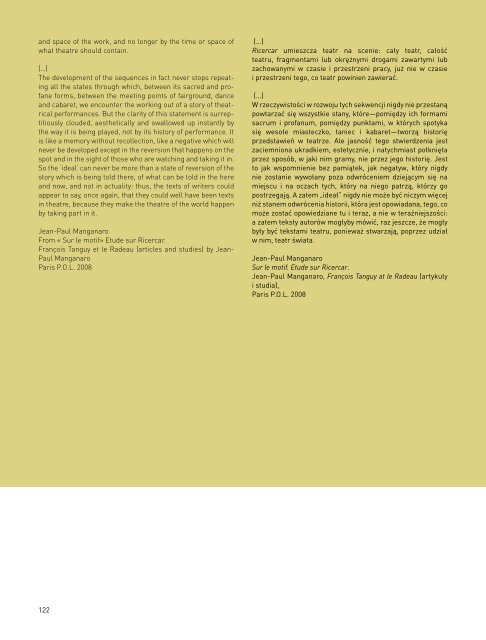Grotowski Institute - Premio Europa per il Teatro
Grotowski Institute - Premio Europa per il Teatro
Grotowski Institute - Premio Europa per il Teatro
You also want an ePaper? Increase the reach of your titles
YUMPU automatically turns print PDFs into web optimized ePapers that Google loves.
and space of the work, and no longer by the time or space of<br />
what theatre should contain.<br />
(…)<br />
The development of the sequences in fact never stops repeating<br />
all the states through which, between its sacred and profane<br />
forms, between the meeting points of fairground, dance<br />
and cabaret, we encounter the working out of a story of theatrical<br />
<strong>per</strong>formances. But the clarity of this statement is surreptitiously<br />
clouded, aesthetically and swallowed up instantly by<br />
the way it is being played, not by its history of <strong>per</strong>formance. It<br />
is like a memory without recollection, like a negative which w<strong>il</strong>l<br />
never be developed except in the reversion that happens on the<br />
spot and in the sight of those who are watching and taking it in.<br />
So the ‘ideal’ can never be more than a state of reversion of the<br />
story which is being told there, of what can be told in the here<br />
and now, and not in actuality: thus, the texts of writers could<br />
appear to say, once again, that they could well have been texts<br />
in theatre, because they make the theatre of the world happen<br />
by taking part in it.<br />
Jean-Paul Manganaro<br />
From « Sur le motif» Etude sur Ricercar.<br />
François Tanguy et le Radeau (articles and studies) by Jean-<br />
Paul Manganaro<br />
Paris P.O.L. 2008<br />
122<br />
(…)<br />
Ricercar umieszcza teatr na scenie: cały teatr, całość<br />
teatru, fragmentami lub okrężnymi drogami zawartymi lub<br />
zachowanymi w czasie i przestrzeni pracy, już nie w czasie<br />
i przestrzeni tego, co teatr powinien zawierać.<br />
(…)<br />
W rzeczywistości w rozwoju tych sekwencji nigdy nie przestaną<br />
powtarzać się wszystkie stany, które—pomiędzy ich formami<br />
sacrum i profanum, pomiędzy punktami, w których spotyka<br />
się wesołe miasteczko, taniec i kabaret—tworzą historię<br />
przedstawień w teatrze. Ale jasność tego stwierdzenia jest<br />
zaciemniona ukradkiem, estetycznie, i natychmiast połknięta<br />
przez sposób, w jaki nim gramy, nie przez jego historię. Jest<br />
to jak wspomnienie bez pamiątek, jak negatyw, który nigdy<br />
nie zostanie wywołany poza odwróceniem dziejącym się na<br />
miejscu i na oczach tych, który na niego patrzą, którzy go<br />
postrzegają. A zatem „ideał” nigdy nie może być niczym więcej<br />
niż stanem odwrócenia historii, która jest opowiadana, tego, co<br />
może zostać opowiedziane tu i teraz, a nie w teraźniejszości:<br />
a zatem teksty autorów mogłyby mówić, raz jeszcze, że mogły<br />
były być tekstami teatru, ponieważ stwarzają, poprzez udział<br />
w nim, teatr świata.<br />
Jean-Paul Manganaro<br />
Sur le motif. Etude sur Ricercar.<br />
Jean-Paul Manganaro, François Tanguy at le Radeau (artykuły<br />
i studia),<br />
Paris P.O.L. 2008


